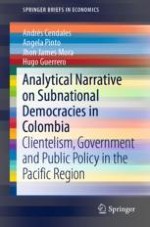2019 | OriginalPaper | Buchkapitel
4. Political Factions and Public Policy in the Local Democracies of the Colombian Pacific: Empirical Evidence
verfasst von : Andrés Cendales, Jhon James Mora, Santiago Arroyo
Erschienen in: Analytical Narrative on Subnational Democracies in Colombia
Aktivieren Sie unsere intelligente Suche, um passende Fachinhalte oder Patente zu finden.
Wählen Sie Textabschnitte aus um mit Künstlicher Intelligenz passenden Patente zu finden. powered by
Markieren Sie Textabschnitte, um KI-gestützt weitere passende Inhalte zu finden. powered by
